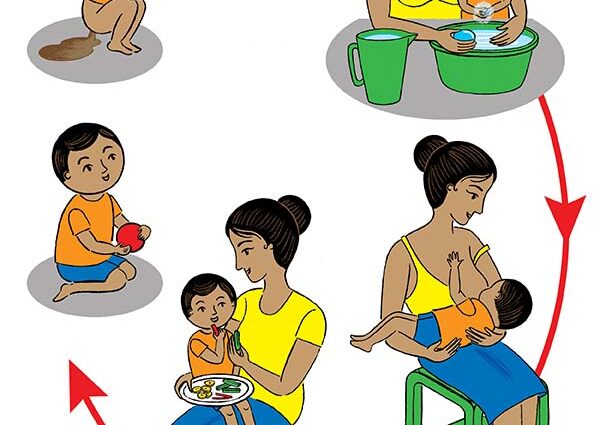Contents
Childhood diarrhea: what to do?
What is diarrhea?
“The emission of more than three stools of very soft to liquid consistency per day defines a diarrhea, qualified as acute when it is of sudden onset and that it evolves for less than two weeks”, explains the French National Society. of Gastroenterology (SNFGE). It is an inflammation of the mucous membranes lining the walls of the stomach and intestines. It is a symptom, not a disease.
What are the causes of diarrhea in children?
The most common cause of acute diarrhea in children is infection with a virus. “In France, a vast majority of infectious diarrhea is of viral origin,” confirms the National Medicines Agency (ANSM). This is the case for the famous acute viral gastroenteritis, which is particularly rife in winter. It often includes associated vomiting and sometimes fever. But sometimes diarrhea has a bacterial origin. This is the case, for example, with food poisoning. “When a child is teething with difficulty, or during ear infections or nasopharyngitis, he can sometimes suffer briefly from diarrhea”, we can read on Vidal.fr.
Beware of dehydration
The hygiene and dietetic measures are the standard treatment for diarrhea of viral origin. It is above all necessary to prevent the main complication of diarrhea: dehydration.
The most vulnerable are the less than 6 months old, because they can become dehydrated very quickly.
Signs of dehydration in young children
Signs of dehydration in a baby are:
- unusual behavior;
- a gray complexion;
- dark circles in the eyes;
- unusual drowsiness;
- a decrease in urine volume, or darker urine, should also alert.
To counter this risk, doctors recommend oral rehydration fluids (ORS) throughout the gastro episode, for infants and adults alike. Offer them to your child in small quantities, but very frequently, several times an hour at the very beginning. They will provide him with the water and mineral salts he needs. If you are breastfeeding, alternate feedings with bottles of ORS. You will find these sachets of powder in pharmacies, without a prescription.
How to speed up healing?
To speed up Choupinet’s recovery, you should also prepare known “anti diarrhea” foods such as:
- rice ;
- carrots ;
- applesauce;
- or bananas, until the stool returns to normal.
For once, you can have a heavy hand with the salt shaker. This will compensate for the sodium losses.
To avoid: dishes that are too fatty or too sweet, dairy products, foods too rich in fiber such as raw vegetables. You will then return to your usual diet gradually, over three to four days. We will also ensure that he rests, so that he recovers as quickly as possible. The doctor will sometimes prescribe antispasmodic drugs to calm the abdominal pain. On the other hand, do not succumb to self-medication.
Antibiotic treatment will be necessary in case of bacterial infection.
When to consult?
If your child continues to eat well, and especially to drink enough, then you don’t need to worry. But if he loses more than 5% of his weight, then you will need to consult urgently, because it is a sign of dehydration. He will sometimes need to be hospitalized for intravenous rehydrate. Then he’ll come home when he’s well.
If the doctor suspects a bacterial or parasitic infection, he will order a stool test to look for bacteria.
Recommendation
Medicines based on clay extracted from the soil, such as Smecta® (diosmectite), available by prescription or self-medication, are used in the symptomatic treatment of acute diarrhea. However, “the clays obtained by extraction from the soil may contain small amounts of heavy metals naturally present in the environment, such as lead”, states the National Medicines Safety Agency (ANSM).
As a precaution, she recommends “no longer using these drugs in children under 2 years of age because of the possible presence of tiny amounts of lead, even if the treatment is short. “The ANSM specifies that this is a” precautionary measure “and that it” has no knowledge of cases of lead poisoning (lead poisoning) in adult or child patients who have been treated with Smecta ® or its generic. »They can be used in people over 2 years old, on medical prescription.
Prevention
It relies, as always, on good hygiene, including frequent hand washing with soap and water, especially after going to the bathroom and before eating. This is the best way to limit the risk of contamination from viral gastroenteritis.
Food poisoning is prevented by avoiding questionable foods:
- undercooked beef or pork;
- not ultra fresh seashells;
- etc.
It is essential to respect the cold chain by putting food that needs it in the fridge as quickly as possible when you return from shopping. Finally, you must be extra careful if you travel to certain countries such as India, where water must for example be consumed exclusively in bottles.










